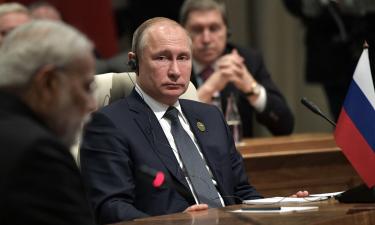Crisis Manager Gaidar in Demand in Iraq
 The provisional administration of Iraq has invited prominent Moscow academic, Yegor Gaidar, who stood at the cradle of Russia's economic reform and was its prime minister in the early 1990s, to draft proposals for the revival of the Iraqi economy. It will be a "brainstorm" and a "joint discussion of the problem with the leading Iraqi specialists," Gaidar told the BBC Russian service.
The provisional administration of Iraq has invited prominent Moscow academic, Yegor Gaidar, who stood at the cradle of Russia's economic reform and was its prime minister in the early 1990s, to draft proposals for the revival of the Iraqi economy. It will be a "brainstorm" and a "joint discussion of the problem with the leading Iraqi specialists," Gaidar told the BBC Russian service.
Yegor Gaidar, 47, is one of Yeltsin's "young reformers." A grandson of famous Russian writer Arkady Gaidar and a son of a retired Rear Admiral and journalist Timur Gaidar, he graduated from the Economics Department of Russia's best higher school, Moscow State University, in 1978, and from its post-graduate courses two years later. He was attracted to economics when he lived with his family in Cuba, where his father worked for the newspaper Pravda at the height of the Cuban Missile Crisis. A trip to Yugoslavia, which was a pro-market socialist country then, only strengthened Yegor's love for economics.
By the mid-1980s Yegor had become a senior researcher at the national research institute of systems analysis at the academic Committee for Science and Technology. He worked for a while at the academy's Institute of Economy and Forecasts of Research-Technical Progress. In 1987 he became economic section head at the then respected Kommunist magazine, and three years later accepted a similar post at the country's main newspaper, Pravda.
It was in the latter half of the 1980s, when Mikhail Gorbachev, "the father of perestroika", came to power in Russia, that Yegor Gaidar soared to the political summit. He frequently met Gorbachev and found likeminded people, who advocated market reforms, including Anatoly Chubais, the current head of RAO UES, future banker Pyotr Aven, and prominent economist Vladimir Mau. The Institute of Economic Policy of the USSR National Economy Academy was set up in 1990 on his initiative and he became its head. The reformer made short-term economic forecasts at a time when the national economy was tottering on the edge of an abyss.
On August 20, 1991, the second day of the communist putsch launched to overthrow President Mikhail Gorbachev, Gaidar headed for the parliament building. It was his way to express support for the putschists' opponent, Boris Yeltsin, and loyalty to the policy of liberal reforms. That autumn it was decided that he should draft a programme of economic reforms and was soon appointed economic adviser to Boris Yeltsin, who favoured young reformers.
Yegor Gaidar's ascent continued in November 1991, when he was appointed deputy premier of the Russian Federation for economic policy and minister of economy and finance. It was a time of crisis, with gold and currency resources at low levels, rocketing inflation, and a dire shortage of consumer goods and foodstuffs. Emergency measures were needed to prevent an economic collapse.
This happened against the backdrop of radical political changes - the dissolution of the Soviet Union, the downfall of the Soviet Communist Party and ideological dogmas, the liquidation of the punitive KGB agencies, and the unlimited freedom of speech and meetings. But freedom was accompanied with tension that threatened to push society into the flames of a civil war. Working in those difficult conditions and using his study of the experience of European countries, Yegor Gaidar and his team launched price liberalisation and privatisation.
But practice soon parted ways with theory. European experience could be applied in Russia only partially and the liberalisation and privatisation campaigns did notgo according to the plan mapped out by Gaidar as the most suitable and salutary for the country.
The so-called privatisation vouchers turned out to be not worth the paper they were printed on and did not fulfil their privatisation mission. The people sold them for kopecks. Large profitable enterprises were proclaimed bankrupt and sold for a song, with their personnel left stranded. Meanwhile, inflation continued to grow, soon gobbling up the meagre savings of the people tucked away for a rainy day back in Soviet times. This hit the low-income groups of population, in particular pensioners, especially hard.
The public blamed Yegor for the social consequences of the "shock therapy" policy. And Gaidar, who launched unpopular measures in a bid to revive the economy and reduce the complicated transition period, knew that he had turned himself into a sacrificial lamb. The Gaidar-led government (he became acting premier in June 1992) compared itself to a kamikaze and was ready for dismissal any day. The moment came in December, when Viktor Chernomyrdin replaced Yegor Gaidar.
In late 1992 the young reformer was presidential adviser on economic matters and director of the Institute of Economic Problems of the Transition Period. In early 1993 he was put on a government credit policy commission. On September 18, 1993, Yeltsin's decree returned Gaidar to the chair of first vice-premier and four days later he became the economics minister.
In the night of October 3-4, 1993, when the supporters of the parliament which opposed Yeltsin took the building of the Moscow city hall and were shot at, Gaidar called on Muscovites in a televised address to defend the president.
This played a vital part in the election campaign, augmenting Gaidar's prestige with the electorate of right-wing forces. In December 1993 he was elected a deputy of the State Duma (the Lower House of parliament) and leader of Russia's Choice faction. In January 1994 Boris Yeltsin accepted Gaidar's resignation from the post of first vice-premier.
Gaidar had his ups and downs as deputy. During the December 1995 parliamentary elections, his bloc Russia's Democratic Choice - United Democrats did not win the required 5% of the vote necessary for representation in the Duma. The academic returned to his post as the director of the Institute of the Economy of the Transition Period.
1999 was a politically better year for Dr. Gaidar, who was elected deputy and became member of the State Duma committee for the budget and taxes.
Yegor Gaidar today is an ideologist of the right-wing movement and co-chairman of the Union of Right Forces (SPS), which rallied the former "young reformers." He is going on with his research, writes monographs and is invited abroad to read lectures (he speaks English and Spanish fluently). The strategic programme of Gherman Gref, the current Minister of Economic Development and Trade, is based on Gaidar's research.
But society remains divided over the phenomenon of Yegor Gaidar. His supporters say that he became the fall guy for the difficult beginning of the radical economic reforms and that Russia would not have become a market economy and could not have launched the economic revival of the past few years without him. His opponents say his "shock therapy" had too many social outlays, which cannot be "compensated" to this day. And Yegor Gaidar believes that the ideas of his party will win the minds and hearts of the young people who were born in free Russia.
Olga SOBOLEVSKAYA, RIAN
Subscribe to Pravda.Ru Telegram channel, Facebook, RSS!





